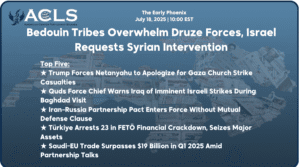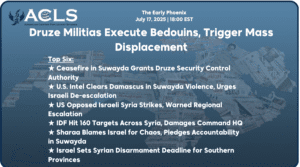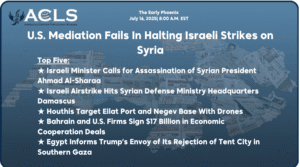2024-3-12
- U.S.-Iraqi Talks on Troop Presence Could Extend Past U.S. Presidential Election.Talks between the U.S. and Iraq on ending the U.S.-led military coalition, formed in 2014 to combat ISIS, may extend beyond the U.S. presidential elections in November, according to an anonymous senior Iraqi official quoted by Reuters. Negotiations offer a pause from recent U.S. and Shi’ite armed group clashes, with Baghdad seeking to avoid becoming a battleground for foreign powers again. While hardline Shi’ite groups demand U.S. forces’ immediate exit, moderate factions and Sunni and Kurdish parties fear a power vacuum. The U.S. aims to reassess the coalition’s mission without necessarily withdrawing military advisers.
2024-3-13
- U.S. Pressures Iraqi Prime Minister to Resolve Disputes with Kurds Ahead of Washington Visit Ahead of Prime Minister Mohammed Shia’ Al Sudani’s anticipated visit to the White House, his first since assuming office in October 2022, Washington is pressuring Baghdad to mend relations with the Kurdistan Regional Government. During recent meetings at the World Economic Forum in Davos, U.S. National Security Advisor Jake Sullivan emphasized the importance of progress in resolving the disputes between Baghdad and Erbil. Ongoing tensions involve budget allocations and oil export disputes, with the Iraqi Federal Court issuing decisions that undermine Kurdistan’s constitutionally established autonomy.
- Iraq in Talks to Import Turkmen Gas Via Iran Iraq is in talks to import Turkmenistan’s gas through Iran, aiming for delivery as early as this summer, according to Iraqi Electricity Minister Ziyad Ali Fadel. A protocol signed in November 2023 outlines the commercial terms for a five-year transfer agreement. With all prerequisites met by January 2024, the deal awaits final negotiations with Iran for transit arrangements. Turkmenistan commits to supplying 10 billion cubic meters of natural gas annually to Iraq. Iraq’s power plants heavily rely on gas imports, particularly from Iran.
2024-3-14
- Iran-Backed Iraqi Militants Claim Drone Attack on Israeli Air BaseThe Islamic Resistance in Iraq announced they targeted the Israeli Palmachim Air Base with drones on March 14, 2024. This operation is part of their continued efforts to escalate actions during Ramadan, in solidarity with Gaza and in response to what they refer to as Israeli aggression against Palestinian civilians. The group vows to intensify their direct attacks against what they call the occupying forces, marking a new phase in their resistance strategy.
- US Ambassador Says US-Iraq Relationship Needs to Expand Beyond SecurityUS Ambassador to Iraq Alina Romanowski emphasized the importance of expanding the US-Iraq relationship beyond mere security ties, advocating for enhanced economic, cultural, educational, and people-to-people relations to build a modern, stable, sovereign, and prosperous Iraq connected to the world. Against the backdrop of ongoing talks concerning the international coalition’s role and the American military presence in Iraq, Romanowski said Baghdad has an opportunity to reflect on its long-term strategic relationship with the US. She also noted the US’s significant contributions to Iraq’s defense capabilities, including over $3.5 billion since 2012 for security forces, F-16 aircraft, M-1 Abrams tanks, and professional training.
2024-3-19
- Kurdistan Democratic Party Decides to Boycott Elections, Signaling Deepening CrisisResponding to a series of Iraqi federal court rulings that threaten the existence of the Kurdistan Regional Government as a constitutional component of Iraq, the Kurdistan Democratic Party has decided not to participate in elections for the KRG parliament scheduled for June. The KDP specifically criticized the federal court’s recent amendments to the election law as unconstitutional, particularly the court’s decision to change the KRG’s electoral districts and to discard minority quotes for parliamentary seats. The political dispute is the latest setback for relations between the KRG and the federal government in Baghdad. KDP leaders say the Iraqi federal court has no constitutional standing, since the Iraqi parliament has never issued the law the constitution requires to define the court’s role, and consequently the court has become an instrument for pro-Iranian political influence in the country. The KDP noted that the federal court appears to be intent on collapsing the KRG as a constitutional entity and on tilting the electoral playing field against the KDP within Kurdistan. U.S. government spokesmen, meanwhile, on Monday urged all Iraqi parties to remain committed to full participation in transparent elections.
- Germany Ready to Sign Military Cooperation Agreement with Iraq Germany announced its readiness to sign a bilateral security and military cooperation agreement with Iraq. This statement was made during the visit of the German State Minister for Foreign Affairs, Tobias Lindner, to Iraq, where he met Prime Minister Mohammed Shia al-Sudani. Al-Sudani highlighted the stability and security in Iraq and the advancement of its security forces, emphasizing the shift towards bilateral relations with international coalition member states. Germany’s announcement coincides with tense talks between the U.S. and Iraq over the continued presence of the international counter-ISIS coalition in Iraq.
2024-3-20
- UN Mission to Investigate ISIS Crimes in Iraq Forced to End Early UNITAD, the United Nations mission established to assist Iraq in investigating accusations of genocide and war crimes committed by ISIS, has been forced to conclude its operations prematurely due to tensions with the Iraqi government. Initiated in 2017, nearly a decade after ISIS’s extensive territorial conquests in Syria and Iraq, the mission’s early termination comes at a time when many victims still seek justice. Despite achieving at least three convictions in Germany and Portugal, critics argue Iraq’s decision to end the mission hampers efforts to hold more ISIS members accountable and casts doubt on Iraq’s commitment to prosecuting such crimes domestically. UNITAD head Christian Ritscher said the mission is not yet complete and highlighted the need for more time to conduct investigations and manage millions of pieces of evidence.
- Sweden Arrests Former Iraqi Defense Minister for Welfare Fraud Swedish authorities detained Najah al-Shammari, Iraq’s former Defense Minister, at Stockholm’s Arlanda Airport under suspicion of defrauding welfare benefits. Al-Shammari, who served as defense minister from 2019 to 2020 and was unknown in Sweden until his sudden political appointment, has been under investigation for “serious fraud” related to receiving Swedish public assistance while residing and earning a full salary in Iraq. Al-Shammari, also known as Najah al-Adeli in Sweden, became a Swedish citizen in 2015 after receiving residency in 2011. The case is ongoing, following his arrest after being sought by Swedish prosecutors for over a year and a half.
2024-3-21
- Iran-Backed Iraqi Militants Claim Drone Attack on Tel Aviv Power StationThe Islamic Resistance in Iraq, the label Iranian-backed Iraqi militants apply to themselves, announced an early Thursday drone attack on a power generation station in Tel Aviv, marking a continuation of their operations against Israeli targets. This follows previous Iraqi militant attacks on Ben Gurion Airport and an Israeli airbase. The Iraqi militants say their attacks will continue until Israel halts its Gaza operations.
- UN’s Role in Iraq Questioned Following Corruption Scandal and UNITAD’s Early TerminationThe United Nations faces scrutiny over its effectiveness in Iraq after a corruption scandal within its Iraq Assistance Mission (UNAMI) and the premature conclusion of its Investigative Team to Promote Accountability for Crimes by Daesh (UNITAD). Critics argue that the UN’s slow and limited results do not justify the extensive resources allocated. The UNITAD mission also suffered from the failure of the Iraqi parliament to pass legislation enabling the Iraqi government to use UNITAD evidence in the Iraqi judicial system, which resulted in most of UNITAD’s evidence being used in cases outside of Iraq.
- Iran-Backed Iraqi Militant Factions Meet in Tehran to Coordinate Strategy Prominent Iraqi militant factions announced on Tuesday they had held a meeting in Tehran to coordinate strategy among themselves and to align their activities with those of the Iranian regime. The public announcement and the meeting itself were unprecedented moves, linking the Iraqi factions’ actions to broader regional tensions, especially in Gaza and southern Lebanon, and underscored Iran’s influential role in shaping resistance strategies against American and Israeli interests.
- Iraq Signs Deal with Siemens to Convert Flared Gas into Electricity Fuel Iraq has entered into an agreement with Siemens Energy to transform flared gas from oil production into electricity. The operation could produce 240 million standard cubic feet of gas annually. This initiative is part of a broader Iraqi effort to harness wasted gas, aligning with environmental commitments and enhancing energy sustainability. Despite its large gas assets, Iraq has been flaring gas from its oil wells for decades rather than using the gas to power the Iraqi electrical grid, and has instead relied on large-scale imports of Iranian electricity to power the grid.
2024-3-25
- Kurdistan’s Political Strife: A Gateway for External Influence In the Kurdistan region of Iraq, a rift between the Democratic Party and the Patriotic Union of Kurdistan has escalated, reigniting tensions and potentially weakening Kurdish political unity. This internal discord opens opportunities for increased Turkish and Iranian interventions, exploiting the situation for their respective gains. Turkey seeks economic and security advantages, leveraging its ties with the Barzani family, while the Patriotic Union’s alignment with Iraqi Shiite factions suggests Iranian influence. These dynamics not only complicate the region’s politics but also risk prioritizing external interests over Kurdish autonomy and stability.
- U.S. Ambassador Says Coalition’s Work Against ISIS is Unfinished U.S. Ambassador to Baghdad, Alina Romanowski, stated that the international coalition’s efforts against ISIS in Iraq are not yet complete, as the group continues to pose a threat. She highlighted the importance of ensuring Iraqi forces are capable of defeating ISIS, underscoring the ongoing commitment of both the United States and Iraq towards achieving a lasting defeat of the terrorist organization. This comes amid discussions for scheduling the withdrawal of coalition forces, emphasizing a future of strong bilateral security partnership between the two nations. The statements align with ongoing talks and a planned meeting between Iraqi Prime Minister Mohammed Shia al-Sudani and President Joe Biden.
- Asa’ib Official Says Iraqi Prime Minister’s Visit to the U.S. Has Approval of Iraqi Clerics Mohammad Al-Baldawi, a leader in the Asa’ib militia, confirmed that Prime Minister Mohammad Shia al-Sudani’s upcoming visit to Washington in mid-April has the approval of influential clerical figures, including the representation of the “Absent Imam” through Ayatollah Khamenei. The visit aims to discuss vital matters including enhancing Iraq-U.S. relations across trade, energy, finance, military, and security sectors. Al-Baldawi anticipates positive outcomes from the visit, highlighting the significant endorsements it has received.
2024-3-26
- Blockade of Red Sea Rekindles Interest in Iraq-Turkey Alternative Trade Route Heightened maritime tensions blocking the Red Sea and Bab el-Mandeb Strait, affecting 15% of global trade, have rekindled interest in the Iraq-Turkey “Development Road” project as an alternative to the Red Sea trade route. Proposed by Iraqi Prime Minister Mohammed Shia’ Al-Sudani during his visit to Ankara, this initiative aims to enhance East-West trade connectivity. Disruptions in maritime navigation have escalated shipping costs, making the Development Road a compelling alternative for future secure trade routes. The upcoming visit of Turkish President Recep Tayyip Erdogan to Iraq is expected to further cement this project, poised to reshape regional trade dynamics.
- Ammar Al-Hakim Advocates for Saudi Role in Iraq’s Urban Development Ammar Al-Hakim, leader of the National Wisdom Movement, emphasizes the significance of Iraq’s political and economic openness towards its Arab and Islamic environment, advocating for a Saudi contribution to Iraq’s urban development. During his visit to Saudi Arabia, Al-Hakim met with Crown Prince Mohammed bin Salman, discussing the enhancement of bilateral relations and the positive impact of Iraq’s stability on regional security. Al-Hakim also highlighted the importance of dialogue in resolving regional disputes and expressed a desire for Iraq to transition towards mutual interests and sovereignty-respecting relations with its neighbors.
- Iraqi Court Acquits Police Officer Previously Convicted in Hisham Al-Hashimi’s Murder An Iraqi court has acquitted a police officer previously sentenced to death for leading a group that assassinated Hisham Al-Hashimi, a government advisor on defeating ISIS and limiting pro-Iranian factions’ influence. Despite earlier confessions, the Baghdad court cited insufficient evidence for conviction. Al-Hashimi was killed outside his home in July 2020, with his death linked to his work against pro-Iranian groups, although no group has claimed responsibility.
- Has Iran Given Türkiye a Green Light for an Offensive Against the PKK?An ambitious deal involving Baghdad, Ankara, and Tehran aims to dismantle the Kurdistan Workers’ Party (PKK) in Iraq, revealing a complex regional shuffle post-Gaza war. With the Popular Mobilization Forces (PMF) playing a pivotal role, this agreement transcends military collaboration against the PKK, hinting at broader Middle Eastern realignments. Turkey’s comprehensive strategy, supported tacitly by Iran, anticipates major shifts in regional dynamics, positioning Ankara for a significant political and military influence in Iraq. However, internal balances and the entrenched presence of the PKK in Sinjar pose substantial challenges to the deal’s success.
2024-3-27
- Iran-Backed Iraqi Militia Claims Drone Attacks on Israeli Military Sites An Iraqi armed militia announced its drone strikes on two Israeli military locations, signaling an escalation in operations against Israel. The group, identifying itself as “The Islamic Resistance in Iraq,” claims it targeted the Speer military site and Avoda Air Base, citing retaliatory motives for Israeli actions against Palestinians.
- Iraq and Russia Explore Cooperation in Nuclear Energy Development Iraq’s Minister of Higher Education, Naeem Al-Aboudi, met with ROSATOM’s Alexey Likhachev to discuss using nuclear energy for peaceful purposes. As the country experiences power outages, Iraq aims to revive its nuclear program, halted since the destruction of its reactors over 30 years ago. The meeting underscores Iraq’s intent to construct a Zero-Energy Experimental Pile (ZEEP) reactor and a research reactor.
- U.S. Allegedly Blocks Iraq’s Purchase of French Rafale Jets An Iraqi security source revealed that the U.S. has obstructed Iraq’s acquisition of Rafale fighter jets from France to maintain U.S. dominance and influence over Iraq’s military capabilities. Iraqi sources claimed the move is an extension of the U.S.’s policy of hegemony, preventing Iraq from enhancing its air defense with advanced weaponry, especially from Eastern countries.
- Baghdad and Washington Reaffirm Commitment to Combat ISIS U.S. Secretary of State Antony Blinken and his Iraqi counterpart Fouad Hussein emphasized their ongoing partnership in the fight against ISIS, acknowledging that the group continues to pose a threat. This commitment was highlighted ahead of a strategic coordination meeting and the Iraqi Prime Minister’s upcoming visit to the U.S.
2024-3-28
- Iraqi Militia Leader Threatens to Attack US Forces if Biden Does Not Withdraw them From Iraq An Iraqi militia leader warned President Joe Biden that his forces are prepared to escalate their campaign significantly if the U.S. does not withdraw its troops from Iraq, hinting at actions surpassing the Hamas attack on October 7, 2023. In an interview with Newsweek, Muhammad al-Tamimi, the secretary-general of the Al-Waad Al-Sadiq militia, described U.S. policy as reckless, threatening to expel American forces in coffins and demean the White House administration if an agreement on withdrawal is not reached.
- Iraq and Turkey Agree to Open New Border Crossing Iraq and Turkey have finalized discussions to inaugurate a new border crossing, aiming to enhance connectivity and development between the two nations. The agreement, facilitated by high-level officials from both countries, focuses on establishing a combined rail and road pathway. This initiative is part of broader plans to bolster bilateral relations and economic growth. Meetings will continue monthly in both Baghdad and Ankara to oversee the project’s progress and implementation in 2024.
- Baghdad and Ankara to Collaborate on Iraqi Railway Development In a move aimed at bolstering trade between Iraq and Turkey, Baghdad and Ankara have agreed to jointly develop Iraq’s railway sector as part of the Development Road project. This agreement, announced by Iraq’s Ministry of Transport, involves detailed technical discussions, training Iraqi personnel in Turkish railway academies, and planning a joint visit to the Turkey-Bulgaria border railway connection. The initiative also includes establishing coordination offices in Baghdad and Ankara to implement the project on a set timeline.



